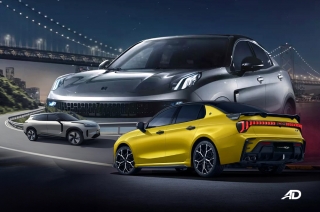
Sports Utility Vehicles (SUV) are one of the most popular categories in the Philippine automotive market. The reason for this could be attributed to their practicality and functionality. They are huge, can seat up to 7 individuals, have high ground clearances, and a relatively attractive price point.
As such, SUVs are the top selling vehicles in AutoDeal’s October 2017 sales report. It accounts for 26.9% of our total vehicle sales last month. So, if you are someone who’s looking forward to buying one, here are some essential things you need to know.

Flexibility and reliability combo
SUVs are built on truck-style chassis with a separate body or more commonly known as body-on-frame construction. Midsize SUVs such as the Toyota Fortuner and the Mitsubishi Montero Sport ride on body-on-frame chassis.
With this, SUVs can serve as both a workhorse or a lifestyle vehicle. They can confidently tackle rough terrain, as most SUVs feature 4x4 drivetrain for better traction in off-road conditions. In contrast, SUVs can also be your daily transporter and family car.

Big means more room for passengers and luggage
With its size, SUVs have ample cargo space and seating capacity. To put things in perspective, the Ford Everest has a maximum cargo capacity of 2,010 liters while a subcompact car like the Honda City only has 536 liters. If cargo space is your top priority, getting an SUV is the more practical choice.
Aside from cargo space, most SUVs can carry up to 7 passengers – a feature that adds to its popularity in the local market.

Height is might
Aside from the 4x4 drivetrain, SUVs also have a high ground clearance and a rugged suspension system that makes them flexible to almost any kind of terrain. With that in mind, SUVs have a good fighting chance in driving through floods, shallow rivers, muddy slopes, and rocky mountain pathways.
Despite of the advantages an SUV can give, there are still factors that you need to consider. Like what they say, there two sides to every story. With that, we listed down some disadvantages of SUVs.
Parking and tight road frustrations
Due to its large body, SUVs are more difficult to maneuver on tight roads or crowded parking lots. It takes more effort to park an SUV as compared to a sedan (obviously). It's longer body also makes it challenging to tell if an object behind your car is already too close to your vehicle.
In addition, the thick C-pillars could block your view when you are backing up the vehicle. Good thing modern SUVs are now integrated with rear cameras, as well as other features like blind-spot detection system.
It requires more garage room
Since we have been talking about size, SUVs are most demanding of garage room. They aren't just difficult to park, they also take much space, leaving you a crowded garage. Compared to owning a compact car, storing your utility vehicle would cause you more problems. So, before opting to get an SUV, make sure that it would fit inside your garage.

More risk of rolling over
As their high ground clearance serves as an advantage over bad roads and extreme weather conditions, it also spurs out some concern. More ride height means higher center of gravity; the higher your vehicle's center of gravity, the more chance for it to roll over. To counter this, manufacturers equip their modern SUVs with Electronic Stability Program (ESP) in order to lessen the chances of rolling over.
All in all, SUVs, just like anything, have their good sides and their not so good sides. It all boils down to understanding your priorities in order to score the best vehicle that would fit your lifestyle or personality. As such, SUV is the most ideal vehicle to consider if you want a machine that could be utilized in business, family, or extreme adventures.
Latest Features
-
An all-electric future: The Porsche Macan Electric / Featured Article
Porsche’s Macan goes all-electric; it’s a new beast with an electrified heart, yet unmistakably Porsche in performance and spirit.
-
Which Kia should I buy? / Featured Article
We’re here to help you decide which Kia vehicle is best for you, whether it’s a sedan, crossover, or minivan.
-
Why Lynk & Co is a good option for luxury car buyers / Featured Article
Lynk & Co offers premium value for those exploring the luxury market.
Popular Articles
-
Electric Vehicles in the Philippines for under P1 million
Jerome Tresvalles · Aug 19, 2025
-
Top 3 Cars For Every Lifestyle—What Cars Are Right For You? | Behind a Desk
Caco Tirona · Apr 24, 2024
-
5 Tips to Maximize Fuel Efficiency
Jerome Tresvalles · Sep 09, 2024
-
Five driving habits that are draining your fuel tank
Jerome Tresvalles · Jun 24, 2025
-
Can engine braking harm your engine?
Jerome Tresvalles · Sep 11, 2025
-
Do electric cars even need maintenance?
Jerome Tresvalles · Oct 23, 2024
-
Best vehicles for an active outdoor lifestyle
Shaynah Miranda · Jul 25, 2024
-
How to drive different types of vehicle transmissions
May 23, 2024
-
5 easy ways to keep your car interior clean
Allysa Mae Zulueta · Nov 15, 2021
-
How to survive Metro Manila traffic
Earl Lee · Aug 16, 2022



